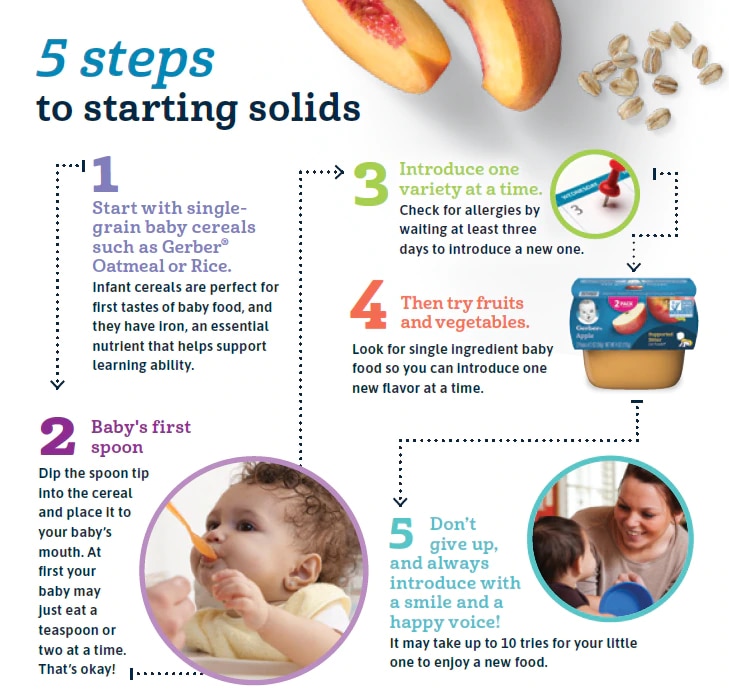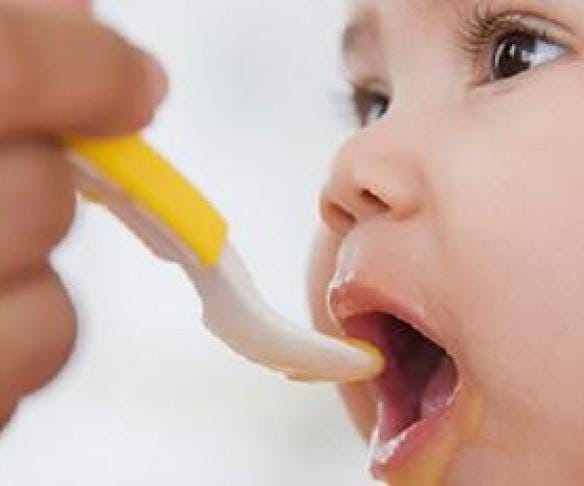How do I know baby is ready for solid foods? Look for these readiness cues
Does your baby:
- Have good head control?
- Sit up with help or support?
- Bring objects to their mouth?
- Seem interested in your food?
- Move their tongue forward when their lips are touched?
- Swallow their food rather than pushing it back out on to their chin?
If you answered "yes" to most of these questions, your baby may be ready for solid foods. Do not offer foods before 4 months, and waiting until after 6 months is also not recommended. Most babies are ready around 6 months. Talk with your pediatrician if you are unsure.
Tips for Starting Solids:
- For those first attempts at eating with a spoon, pick a time of day when your baby is in good spirits, wide awake, and mildly hungry.
- You might try a weekend morning, so there's no need to rush. A relaxed atmosphere increases your chances of having a successful first experience.
- You can give baby some breastmilk or formula before their first solids so they are not uncomfortably hungry.
- When mixing cereal, be sure to use breastmilk or formula. This familiar taste helps your baby accept the new taste of cereal.
Nutrition Counts with First Bites - All About Iron
Around the middle of the first year, babies need iron from the foods they eat - especially when they are breastfeeding. Iron-fortified baby cereals help provide this important nutrient that supports your baby's healthy growth and brain development.
Q: I'm just starting my baby on solids. What's a healthy balance between breastmilk/formula and solid foods?
A: Breastmilk or formula are baby's main source of nutrition, but foods need to be nutritious too. While baby's first solids are about the experience of tasting new flavors, experiencing new textures, and learning to eat from a spoon – they also should be nutrient dense foods like iron fortified infant cereals, pureed meats, and veggies and fruits prepared for baby.
Most babies continue their usual amount of breastmilk or formula when starting solid foods. As they get closer to their first birthday, more of her calories come from foods and breastmilk/formula intake may begin to decrease.


What's Ahead
Expose baby to a variety of grains and fruits. Once your baby is comfortable eating foods and has accepted a few varieties add more variety with single-grain cereals, mixed grain and fruit cereals.
- Mixed grain cereals are made with whole grains.
- Gerber Fruit Cereal with Probiotics. The probiotics help support baby's digestive health when eaten every day.
Introduce baby to new tastes and textures. When baby begins to self-feed with fingers and begins to use their jaw to mash foods, they may be ready for new textures.
- Gerber Lil' Bits Cereals have added texture to help babies learn to chew, mash and transition to table food and continue to provide the iron babies need from cereal for the whole first year.
Make Every Bite Count!
Our cereals have nutrients that babies need for growth and development.
- Iron helps support baby's learning abilities.
- Vitamin C Aids in iron absorption.
- Calcium - the strong-bones-and-teeth builder.
- B Vitamins help convert food into energy.
- Vitamin E and Zinc help support baby's immune system and healthy growth.







